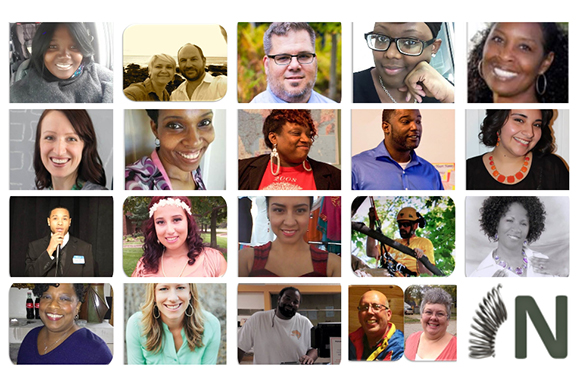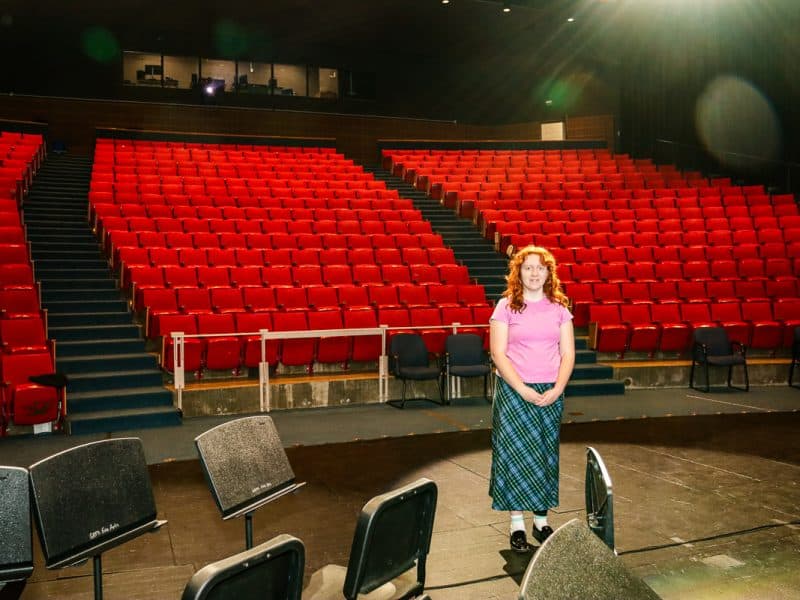Making it in GR: Despite gains for entrepreneurs of color, inclusiveness remains a work in progress
Even though minority-owned businesses in Grand Rapids have grown in number in recent years and organizations like Spring GR have arrived on the scene to support startups in underserved communities, entrepreneurs of color continue to face distinct challenges and longer odds, especially in the capital-intensive high-tech sector.

Even though minority-owned businesses in Grand Rapids have grown in number in recent years and organizations like Spring GR have arrived on the scene to support startups in underserved communities, entrepreneurs of color continue to face distinct challenges and longer odds, especially in the capital-intensive high-tech sector.
Talk to any number of different entrepreneurs and you’ll likely hear one common thread emerge about their experiences: Making it as an entrepreneur is hard. The usual rule of thumb among investors and business owners alike is that nine out of 10 startups fail, and those who make it need to have a rare combination of vision, work ethic, support, and good old-fashioned luck.
There’s one thing that might actually be harder than succeeding as an entrepreneur, though: Succeeding as an entrepreneur of color.
Despite some of the challenges that minority entrepreneurs face, the gains they have made in recent years are impressive, at a glance: about 29 percent of U.S. businesses are minority-owned as of 2014, up from about 15 percent in 2001 (and much closer to the 37 percent share that minorities make up of the general population), according to data from the U.S. Census Bureau.
In Grand Rapids and Wyoming, the same data shows, minority-owned businesses grew 59.9 percent between 2007 and 2012 to make up 25 percent of total businesses.
But these encouraging gains exist alongside some more troubling statistics, too: minorities account for just 4 percent of all business revenue in the U.S., and only 1 percent of venture capital-funded startups are founded by Black entrepreneurs.
Meanwhile, Grand Rapids ranked second-to-last in urban studies researcher Joel Kotkin’s January 2015 analysis of the cities where African-Americans are doing the best, as published by Forbes. The rankings, which analyzed the 52 largest cities in America, were based partially on the rates of self-employment for African-Americans.
“Self-employment rates [for cities like Grand Rapids, Cleveland, Buffalo, and Pittsburgh] are half as high as those in our top 10 cities,” Kotkin wrote in the accompanying article.
One person who intimately understands the challenges that entrepreneurs of color face is Attah Obande of Spring GR. As a former banking professional and a current small business owner, business consultant and hub coach at Spring GR, Obande works with entrepreneurs from underserved neighborhoods in Grand Rapids, many of them entrepreneurs of color.

Often, he says, the people who have ideas for small businesses in these neighborhoods lack formal business training, which is why Spring GR formed in 2014 as a privately-funded program under the direction of Kafi and Rudy Carrasco of Restorers Inc.: to provide from-scratch entrepreneurial support and access to resources and connections where none had existed before.
“At the time we started, there was really nothing in those communities to give those entrepreneurs access to training,” Obande says. “There are entrepreneur support organizations out there that are great at what they do, but they aren’t training at the grassroots level. We believe that access to training and access to opportunity are essential, so Spring GR comes along and tries to give that access and then connect entrepreneurs to resources that they might not otherwise have known about.”
Enrollees at Spring GR pay a $100 fee for 12 weeks of entrepreneurship courses, which are based on a curriculum developed by Co.Starters in Chattanooga, Tennessee and take place concurrently at four different sites. The courses, which run twice a year, culminate in a “pitch night” event for all graduates where top entrepreneurs from the four sites pitch their startup ideas to judges, “Shark Tank”-style, to compete for grants of $3,000, $2,000 and $1,000 for first, second and third place.
After graduation, Spring GR continues to support entrepreneurs for an additional two years through ongoing business consulting, mentoring and connections.
Obande says, though, that he realized early on in his work for Spring GR that teaching entrepreneurs about basic business principles, helping them through paperwork and getting them to think about target markets and cash flow was only one facet of providing the support that entrepreneurs of color need.
In particular, he says, he’s observed that entrepreneurs of color struggle to grant themselves the “freedom to fail” in the early stages of a business idea — partially because of economic realities in lower-income communities and partially due to nagging self-doubt that takes root in the absence of a culture of entrepreneurship.
Getting entrepreneurs to accept that they have a “license to fail” when it comes to honing their ideas and navigating the early stages of their business development, Obande says, has become one of the most important and gratifying parts of his work encouraging entrepreneurs of color.
“About five or six weeks into my first [cohort at Spring GR], I’m sitting across the table with an entrepreneur and I’m going over her numbers with her,” Obande says. “She wants to start a cleaning business. As I’m going through her numbers, she looks up at me and says, ‘I think I believe this is actually gonna happen. I think I’m past my fears.’”
“At that point, I realized there’s a lot more to this than just teaching business principles,” he continues. “This is kind of rebuilding self-worth in people, where it’s like a paradigm shift. They finally realize, ‘Okay, I can fail at some of the little things, but as long as I’m putting my nose to the grindstone and tweaking and pivoting, this is actually possible.’”

Local entrepreneur and Spring GR graduate Glenn Ellis, who operates the entertainment and event company Pure Harmony Entertainment with his wife Juanita Martinez-Ellis, agrees that entrepreneurs of color sometimes struggle with self-doubt, and also with a lack of context for business ownership. He says that in his experience, African-American families and friend groups typically don’t have conversations around business ownership, which creates a disconnect with the very idea of self-employment.
“We often don’t get to see people that look like us in ownership positions, so it’s hard for us to visualize it,” Ellis says. “So the discussion isn’t there — it’s more ‘Who will you work for?’ or ‘How can you get a job?’ rather than ‘How can you start something?’ So it’s just not part of the normal dinner table discussion coming up [in African-American communities].”
Ellis, who decided to take his company from a part-time occupation to a full-time business venture last year with help from Spring GR and support from his wife, says that Spring GR has been just as important for him as a networking touchstone and a way to create a brotherhood of peers as it has a source of business education.
“The growing network of entrepreneurs from each class adds to the network, and we have sort of fraternity-type feel,” he says. “And that can be really helpful both from a practical business standpoint and also just to have someone there as a sounding board and source of support.”
Not all of the issues that entrepreneurs of color face come from within, though, as Ellis’s story illustrates. He says that as a small business owner, he’s experienced instances of real discrimination based on race, from events spaces raising his deposit once they found out he would be hosting a primarily Black audience to an owner walking back an “option to buy” on a potential lease.
“One venue I felt really good about in terms of square footage and location, it turned out to be a lease with an option to buy,” he says. “But when I looked at it, I was told, ‘Well, they definitely won’t sell it; they may lease it to you, but they don’t want to commit to selling it until they get to know who the neighbors are because they want to make sure the right person buys it.’”
Obande agrees that entrepreneurs of color face real hurdles, even after their confidence is bolstered and their business idea is up and running. He says that many minority business owners tend to feel alienated from some of the available support channels for entrepreneurs, for example, because they don’t see people like themselves represented on the boards and in the leadership of support organizations.
“Even with some of the organizations around town that are there to help entrepreneurs, when entrepreneurs of color don’t feel like they have a legitimate seat at the table, that stops them from taking advantage of some of the services those organizations have to offer,” he says.
Ellis agrees that he’s experienced this phenomenon, and also says he’s witnessed a mixed history of half-hearted attempts from Grand Rapids city leaders and community organizations when it comes to engaging with communities and entrepreneurs of color.
“We get invited to a lot of discussions and talk about issues, but there’s very seldom any follow-through after they’ve gotten the data,” Ellis says. “Once we tell them what it would take [to really make progress on inclusiveness], that’s the end of it. A lot of times, a commission or board will make it mandatory that they at least engage a certain community before something takes place. So we meet with them just so everything is checked off the list, but in reality they didn’t use the info.”
If many entrepreneurs of color aren’t being reached by Grand Rapids’ network of entrepreneur support organizations, however, that creates an issue: Where will an entrepreneur of color who has a capital-intensive idea — an app, for example, or an electronic device — turn after Spring GR? A $3,000 prize might mean a great deal for a lifestyle-based business like a homemade jewelry company or an events and entertainment startup, but it’s barely a drop in the bucket when it comes to developing software or consulting with engineers about a device.
This problem seems endemic to the capital-intensive world of high-tech and high-growth startups, where the challenges that entrepreneurs of color face become even more pronounced. In 2014, for example, 51 companies in Michigan received funds from Michigan venture capital firms, including 12 companies from West Michigan, but not a single one of these companies had a CEO who was a minority and only 8 percent had CEOs who were women, according to a 2015 report from the Michigan Venture Capital Association.
One organization that’s trying to solve this problem in part through intentional funding of minority-owned and women-owned businesses is Detroit’s New Economy Initiative (NEI). Launched in 2007 as a pool from a number of philanthropic foundations, NEI has to date invested $134 million in about 1,600 startups, about one-third of which are owned by women and about 40 percent of which are owned by people of color. Many of NEI’s investments have come in the high-tech sector, although the fund has expanded over time to include a diverse range of businesses.
Pamela Lewis, a former engineer and consultant for the non-profit Kauffman Foundation who was named NEI’s director in January, says that it’s critical for communities to prioritize diversity in entrepreneurship for a number of key reasons. For one, she says, it’s important for women and people of color to see success stories and sources of inspiration that they can relate to among their community of entrepreneurs.
But perhaps more importantly, she says, if we don’t fund entrepreneurs from diverse backgrounds then we may lose out on their unique perspective when it comes to identifying problems and searching for solutions.
As an example, she cites Detroit physician and entrepreneur Patrick Hines, whose company Functional Fluidics is working to assist physicians in the testing and treatment of blood disorders like sickle cell anemia — a condition which mainly affects African-Americans.
“[Dr. Hines’] motivation, in part, is that sickle cell anemia is a disease that typically affects people of color, and it’s a disease that hasn’t had any real innovation in the last 40 or 50 years in terms of testing or treatment,” Lewis says. “So I cite him to say that as more women and minorities get involved in this space, they may be addressing different types of problems that the broader community may not be aware of or may not be focused on.”
As for how other communities might replicate NEI’s model, Lewis suggests that one of the most important keys to the fund’s success so far is its roots in philanthropic funding, which has allowed NEI to pursue data-tracking and reporting measures that go well beyond what’s normally associated with publicly-funded projects.
“When we first started to have this conversation [about inclusiveness in entrepreneurship], you couldn’t convince anyone they were excluding people because no one overtly does it,” Lewis says. “But as part of our grantmaking, we built in data-tracking that allow us to track not only the people being helped by our grants and their outcomes, but also how many were women, people of color, immigrants, and so on.”
Attah Obande says that he and his colleagues at Spring GR have also talked about the idea of starting such a fund in Grand Rapids, but he says they would only explore such a project in earnest if their entrepreneurs can’t find success with current channels for support and funding. He thinks a fund with a model like NEI’s, however, could be a boost for Grand Rapids’ entrepreneurial ecosystem.
“I think that model would be great here because we need those types of entrepreneurs here,” he says. “Those entrepreneurs that are in that space get a seat at the table, and then with them having a seat, it makes opportunities for others. But for now, if those entrepreneurs are just up and leaving, it’s not creating any room for [people of color] to start getting into those roles.
Glenn Ellis points out, though, that the African-American community in Grand Rapids has its own responsibility to nurture entrepreneurs of color across the spectrum of startups by supporting local businesses, and those businesses need to support each other, too.
Too often, he says, he sees the opposite as businesses in Black neighborhoods treat each other like enemies in competition for limited resources.
“A lot of times, we don’t support our own businesses,” he says. “And they don’t support each other. They haven’t gotten to the point where they’re willing to work with each other or partner with each other to have a solid business community. They’d rather compete against each other, like crabs in a barrel pulling each other down to get to the top. And that’s something we’re doing to ourselves.”
Still, he says, his nine-plus years of experience as a small business owner in Grand Rapids and his sense of the community here give him plenty of hope for the future.
“I know from experience that Grand Rapids is a giving community, and we have a lot of people with big hearts here,” Ellis says. “I know the desire is there for change, but we just need more people to have that will to make it happen.”
“Making It In Grand Rapids” is a series about local entrepreneurs and the issues that matter in building a sustainable startup-friendly community. Support for this series is provided by Start Garden. You can reach the author of this story on Twitter @steventkent or e-mail him at steventkent@gmail.com for story tips and feedback.








